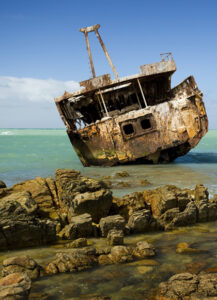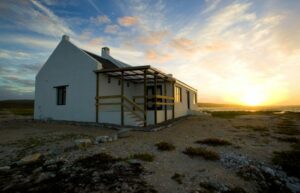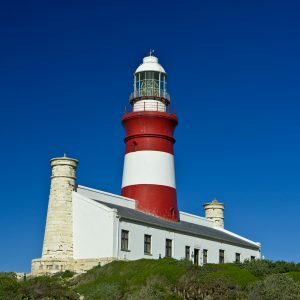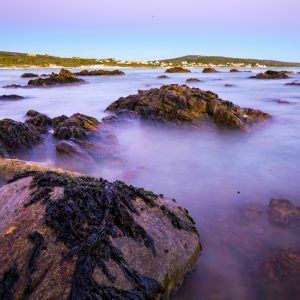-
Contact emailderick.strydom@sanparks.org
- Bookmark
- Claim National Park
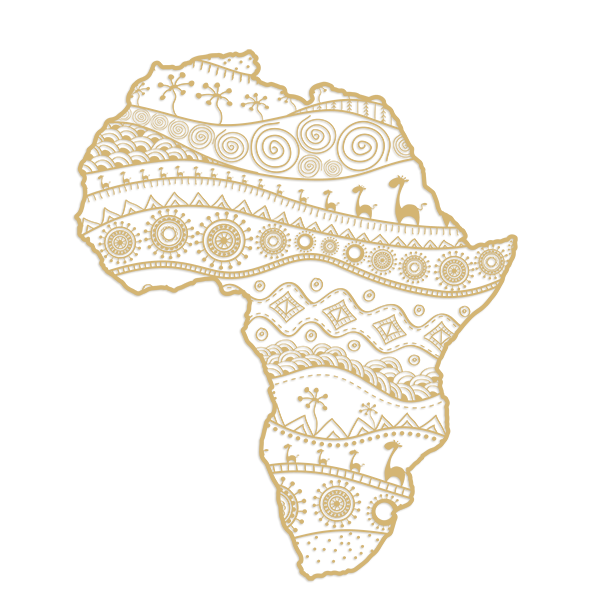
- Profile
- Tour Operators
- Accommodation
- prev
- next
Overview
The area around the southern-most tip of Africa, often referred to as the Agulhas Plain, has rich natural and cultural features, which make it worthy of national park status. The Agulhas Plain is of international significance due to its rich plant biodiversity, with species richness values equalling those of tropical rain forests.
It has approximately 2000 species of indigenous plants including 100 which are endemic to the area and over 110 Red Data Book species. Consequently, the Agulhas Plain is a very important component of the Cape Floral Kingdom, the smallest and richest of the world's six plant kingdoms.
The Agulhas Plain is unique in that a wide variety of wetlands occur in the area, contributing to a high diversity of wetland plants and aquatic invertebrates. This is also home to the endangered Cape platanna and the micro frog. In addition these wetlands attract a host of water birds, with over 21 000 migrant and resident wetland birds estimated to occur in the area annually. The coastline supports a rich marine and intertidal life, with breeding sties of rare coastal birds such as the African black oystercatcher. The nearby islands are home to a variety of seabirds and seals.
In spring and early summer southern right whales frequent the waters of the Agulhas coast. Besides its ecological importance, the Agulhas area has a rich cultural heritage. A reconnaissance of the area has established the presence of significant archaeological sites along the coast. The discovery of stone hearths and pottery, together with shell middens, link the archaeological deposits with the era of Khoisan migration and settlements.
The Agulhas area also provides history of a different kind – numerous shipwrecks of the early explorers attempting to conquer the wild seas off the southern tip of Africa, dot the coastline. Many national monuments are found in the area, such as the historical Cape Agulhas Lighthouse, which has been in operation since 1849. In addition, historical buildings such as the water mill at Elim and certain homesteads reflect the European influence in the history of the region.
Explore More SANParks
Reservations Contact Centre Business Hours:
- Monday to Friday: 07:30 – 16:00
- Saturday/Sunday & Public Holidays - Closed.
- Reservations Contact Centre Number: 012 428 9111
Please note that year in advance bookings for November 2024 will open on the 1st of December 2023.
FESTIVE SEASON WORKING HOURS – 2023/24
Reservations Contact Centre, Travel Trade, Front Office, Specialized Reservations, Reservations Finance and Wild Card Offices.
| DATE | OFFICE HOURS |
| 15th December 2023 | Closed (Public Holiday) |
| 18th – 21st December 2023 | 7:30 – 14:00 |
| 22nd December 2023 | 7:30 – 12:00 |
| 25th December 2023 | Closed (Public Holiday) |
| 26th December 2023 | Closed (Public Holiday) |
| 27 – 28th December 2023 | 7:30 – 14:00 |
| 29th December 2023 | 7:30 – 12:00 |
| 1st January 2024 | Closed (Public Holiday) |
| 2nd - 5th January 2024 | 7:30 – 14:00 |
On Monday January 8th office hours will resume as normal from 7h30 to 16h00.
For your convenience, you may make a Booking Online at www.sanparks.org and earn yourself a 5% discount.
For any Short Notice bookings, you are welcome to book directly with the camps.
NB: Bookings for December 2024 and January 2025 will open on 23 January 2024 at 07h30 am.
For other related queries:
- Refunds - Reservation.Refund@sanparks.org
- Payments - reservationpayments@sanparks.org
- Travel Trade: traveltrade@sanparks.org
- Specialized Reservations: specialisedreservations@sanparks.org
- Wild Card: wildcard@sanparks.org
Location
-
Agulhas National Park, 214 Main Road, Agulhas, Agulhas, Western Cape 7287, South Africa
Vital Park Information
South Africa
209,6 km²
Drinking water in South Africa is considered safe when taken from the tap or faucet – in fact our tap water is said to be some of the safest and cleanest in the world.
South African rand (ZAR)
Low Risk - Not necessary to take anti-malaria drugs
January, February, March, April
Best Time to Visit Cape Town. The best time for a Cape Town beach holiday is from late January to late April, the tail end of the city's dry summer months. Cape Town enjoys a temperate climate with warm, dry conditions from October to April.

